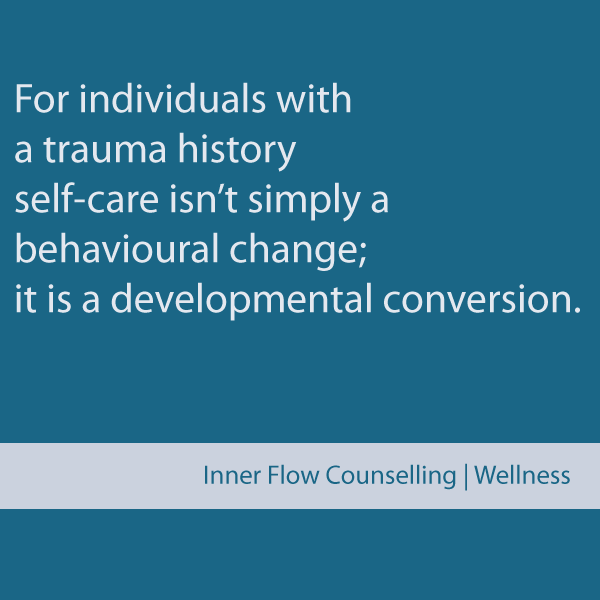
Self-worth. Self-love. Self-compassion. Self-care. Why is it so hard?
Why is it so hard to feel worthy? Why is it so hard to feel deserving of love? Why is it so hard to stop critical thoughts?
These are topics that come up frequently with clients, and it’s a common struggle for adults who’ve experienced trauma in their childhoods. Trauma is anything that we experience as being deeply distressing; any experience where our nervous system is unable to find a resolution and we don’t yet have the resources to handle the stress or (and this is key) the support to help us navigate the distress.
Bypassing Needs
The majority of people I work with have had childhoods where they didn’t feel inherently safe. All too often, children in these environments learn to stand guard and keep watch, anticipating the nuanced or obvious behaviour of their caregivers to try and keep themselves as safe as possible. This results in a nervous system on high alert for potential threats. The child learns to bypass their own needs to attend to the instability of their caregivers and/or home environment.
Moral of the Story
Trying to find order amongst the disorder, children begin to internalize messages from their environment, families, friends, and society. Messages can be directly conveyed or inferred. It is input taken in without discrimination. Think of a child trying to understand the moral of a story that’s way too elaborate for their developmental stage. The child is simply trying to make sense of and apply these lessons so they may be better equipped to handle life. This is about survival. A part of our brain called the limbic system, stores and generalizes these memories so that we become more adept at detecting threats; this is a conditioned response based on survival and self-protection.
For these young minds, the messages all too often boil down to being internalized as core beliefs such as “I am not worthy,” “I am unlovable,” or “I am not enough.”
Dulled Awareness
In these types of environments, children learn to internalize these messages and intense emotions. They become adept at repressing their feelings and numbing themselves to physical sensations. In this way, children are split off from emotions and physical sensations that are vital for informing them what they require to feel safe and healthy and to sense boundaries in their own bodies. They learn to disregard the warning signs and cues that the body offers to aid in nervous system regulation.
Critical Voice
Enter the critical voice. One adaptive skill for trying to make sense of a traumatic childhood is developing a narrative that is critical of the self. This critical voice believes it is safer to target ourselves than to target anything outside of ourselves. In essence, the violence is internalized; “on some level they firmly believe that these terrible things were done to them because they are terrible people” states Bessel van der Kalk.
Internalized threat
As Christopher K. Germer and Kristen Neff note, “when we’re threatened internally by intense emotions such as dread or shame, the fight-flight-freeze response turns into the unholy trinity of self-criticism, self-isolation, and self-absorption.”
Think about this for a moment; this is huge! Trauma symptoms occur when our nervous systems are unable to find resolution. So, when we cannot complete a fight response, we may internalize the arousal symptoms and experience self-criticism. When we internalize the avoidance response of flight, we may self-isolate; when we internalize the intrusive stress response of freeze, we may respond with self-absorption*.
*Self-absorption refers to how symptoms from the stress response can become a preoccupation.
The Resulting impact
If our early years taught us to negate our own needs for the needs of others, inhibit our emotional and somatic signals, and/or internalize messages that led to critical narratives, then how are we expected to know what we need, believe that our needs matter, and learn to care for ourselves?
If we were not given the nurturing, care, or warmth that we required as children, how can we expect to replicate these behaviours as adults?
Getting Support
It is not enough to try and change your thinking to a more positive outlook or buy some nice bubble bath. Though do these things too! Do the things that make you feel great because you deserve to.
As you can see, the impacts of childhood trauma are insidious and require a deeper level of care and attention than changing our external self-care habits or trying to think positively.
For individuals with a trauma history, self-care isn’t simply about changing behaviour. It is about looking at the undigested rules, beliefs, and narratives we still hold from society, friends, and family that get in the way of us connecting to our truth. It becomes a developmental conversion, exchanging old belief systems that were never our truths to find out what we truly value and who we are outside of the constructed belief systems.
It is vital that we make contact with our emotional pain in a safe and nurturing manner. This may require the support of a trauma-informed practitioner who can help in unravelling and expressing what you as a child never got to. A trained professional can provide an honouring and compassionate environment where this type of work can happen, and they can support you in regulating your nervous system and allow you to stay present throughout your healing process. Ideally, therapy would include a somatic component since the body, brain, and nervous system store our experiences. To heal trauma, we need to engage our whole self’s body, mind, and spirit. We need to feel the support of others.
Creating a support network that will help you along your journey and develop your own vitality is a show of resiliency and strength.
